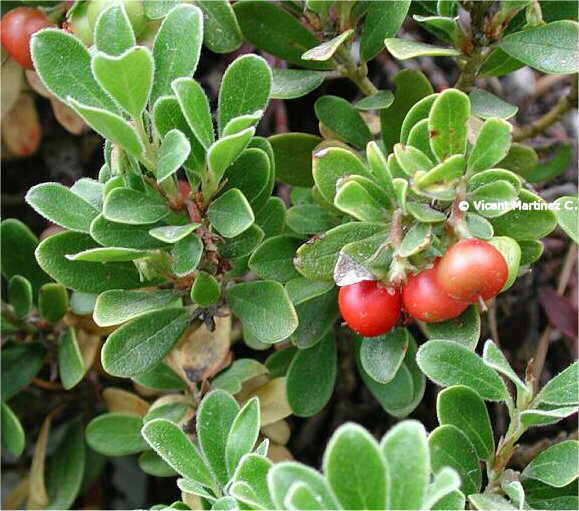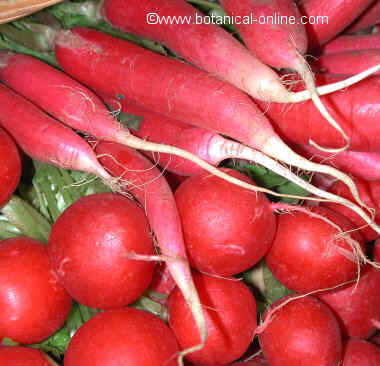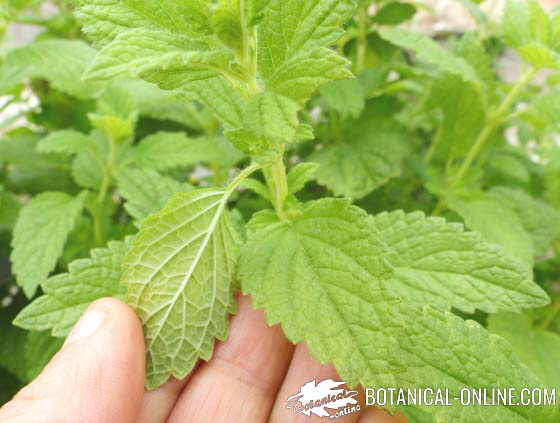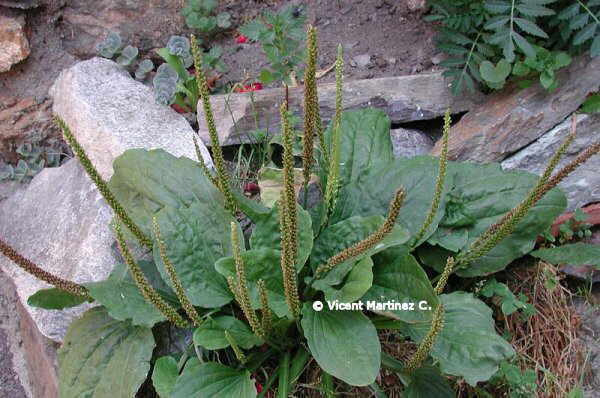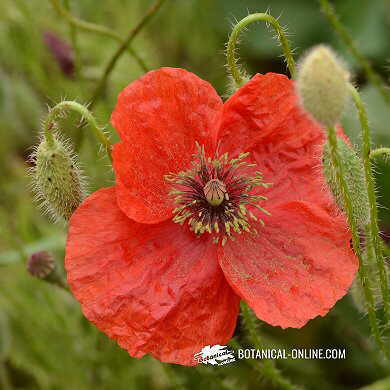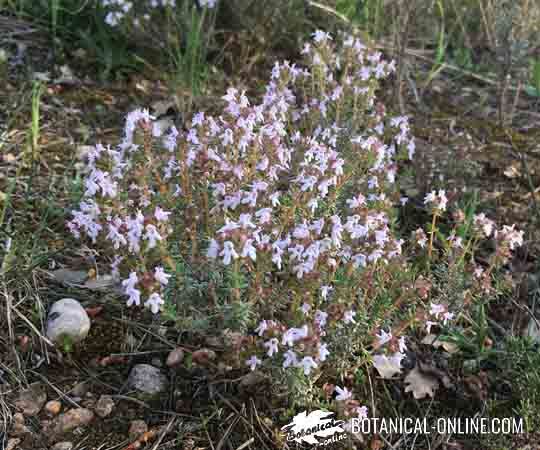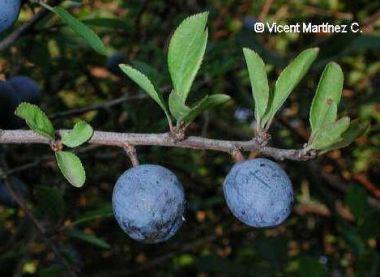Contents
- 1 Medicinal properties of honeysuckle
- 1.1 PREPARATIONS WITH HONEYSUCKLE FOR INTERNAL USE
- 1.2 Honeysuckle, a traditional remedy for the respiratory system
- 1.3 Honeysuckle to improve liver
- 1.4 Is honeysuckle suitable for treating constipation?
- 1.5 Honeysuckle for fluid retention
- 1.6 Honeysuckle for the nervous system
- 1.7 EXTERNAL USE REMEDIES WITH HONEYSUCKLE
- 1.8 Honeysuckle for injuries and skin problems
- 1.9 Is the medicinal use of honeysuckle dangerous?
Medicinal properties of honeysuckle
PREPARATIONS WITH HONEYSUCKLE FOR INTERNAL USE
Honeysuckle, a traditional remedy for the respiratory system
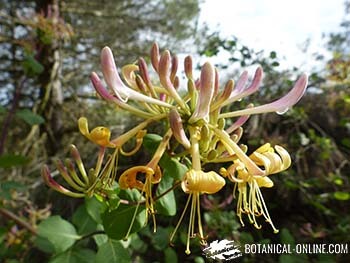
The flowers of honeysuckle have properties suitable for the treatment of respiratory diseases. Fundamentally, its richness in carvacrol, geraniol and chlorogenic acid provide its antiseptic properties; Carvacrol and luteolin are antitussive; And all these components have anti-inflammatory properties.
All this makes honeysuckle very suitable for the treatment of conditions such as:
- Cough: The plant exerts a balsamic and anticonvulsive function that allows to diminish the attacks of convulsive cough that accompanies many respiratory diseases. (Infusion of one tablespoon of dried flowers per cup of water for 15 minutes. Take a couple of cups a day, sweetened with honey)
- Asthma: These same properties can be helpful in preventing asthma attacks (Infusion of a few cu dried flowers per cup of water. Take a couple of cups a day)
- Cold: The preparations of this plant improve the symptoms of cold. (Infusion of one tablespoon of dried flowers per cup of water for 15 minutes Take a couple of cups a day, sweetened with honey)
- Bronchitis: Carvacrol and geraniol have expectorant properties so they help to expel the secretions of the patients from the bronchi. The antiinflammatory properties of this plant decrease the respiratory distress of these patients and moderate their coughing attacks.) (Use the previous preparation)
- Influenza: The use of this remedy is effective to reduce the negative symptoms of influenza.
- Tuberculosis: The infusion of forsythia (Forsythia suspended) and honeysuckle, unites the antiseptic properties of the first with the beneficial properties for the respiratory system provided by the second. Thus, it is also extremely interesting, to help combat the effects of tuberculosis.
Honeysuckle to improve liver
Honeysuckle has been widely used for its hepatoprotective properties. It protects the liver, tones it and helps it to recover when it is affected by some disease or some toxic product.
This has been used mainly for the treatment of:
In both cases, make a decoction for 5 minutes of three tablespoons of dried leaves and one teaspoon of dried flowers. Let it cool and take a couple of glasses a day before the two main meals
Is honeysuckle suitable for treating constipation?
Although the fruits of this plant or its seeds have been used in the past as purging or vomiting, they are very toxic and it is more convenient NOT to use them in the treatment of constipation.
Honeysuckle for fluid retention
The diuretic properties of this plant have been used to remove excess leftovers from the body and to purify the body in general. The richness in calcium, magnesium and potassium, along with luteolin and chlorogenic acid are responsible for this activity. All this is used fundamentally to treat anomalies such as:
- Liquid retention: The preparations of this plant help decrease edemas and body swelling. (Infusion for 10 minutes of a pinch of crushed leaves per glass of water, take two or three glasses a day)
- Arthritis: The antiinflammatory and diuretic properties of this plant are very suitable for the treatment of arthritis. Its use helps to eliminate accumulated fluid in the joints and disinflame them, reducing the pain and favoring the mobility of the patients. (Infusion for 10 minutes of half a teaspoon of crushed leaves per glass of water, take two or three glasses a day)
- Stones in the kidney: The above treatment is adequate to promote the expulsion of kidney stones.
Honeysuckle for the nervous system
Honeysuckle contains sedative properties that can be used for the treatment of nerves and arrhythmias or palpitations that have a nervous origin. (Infusion of one teaspoon of dried flowers per cup of water. Take a couple of cups a day)
These same properties can be used to relax muscles and decrease involuntary spasms.
EXTERNAL USE REMEDIES WITH HONEYSUCKLE
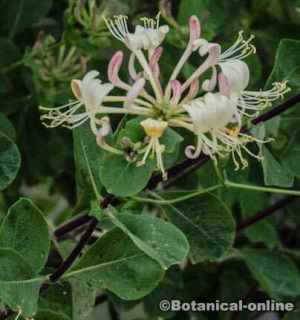
Honeysuckle for injuries and skin problems
Chlorogenic acid, tannins and zinc provide honeysuckle with vulnerary properties that make the honeysuckle a very suitable plant in the treatment of external conditions of the skin. It can be used for the treatment of:
- Sores: For the treatment of skin sores you can make a decoction of 5 tablespoons of dry leaves per liter of water for 12 minutes. After cooling, apply with a gauze over the affected area.
- Mouth ulcers: This same treatment is very effective for the treatment of mouth ulcers (performing mouthwashes with the liquid resulting from the mentioned decoction).
- Wounds: The decoction of the dry leaves, applied on a wound, helps to disinfect and favors its healing. (Wet the wound with the liquid resulting from the decoction of 5 tablespoons of dry leaves per liter of water for 10 minutes) (Squeeze a tender leaf and apply directly on a wound)
- Sore throat: For its astringent and antiseptic properties, it is very useful for the treatment of sore throat (Perform gargles with the liquid resulting from the decoction for 10 minutes of a teaspoon of dry leaves per cup of water sweetened with honey.
- Bleeding gums: These same properties have been used for the treatment of gingivitis. The honeysuckle is able to deflate the gums and stop bleeding at the same time that its antiseptic properties prevent possible infections in this part of the mouth.
- Wrinkles: The essential oil of the honeysuckle, applied on the skin, will help to improve the appearance of wrinkles, especially will contribute to diminish them and to prevent their appearance. (Apply honeysuckle oil. It can be bought in herbalists and cosmetic stores)
Is the medicinal use of honeysuckle dangerous?
The use of flowers and leaves in appropriate doses does not present side effects, although it is recommended NOT to use it in case of pregnancy or lactation, because there are few studies with respect to it.
Although no poisonings have been described in the medicinal use of flowers and leaves, you have to be extremely cautious in the preparations since this plant contains toxic principles.
All honeysuckles are very rich in saponins and principles similar to nicotine. These principles attack the digestive system causing vomiting, diarrhea, convulsions, heart alterations and even death.
![]() More information on honeysuckle.
More information on honeysuckle.

